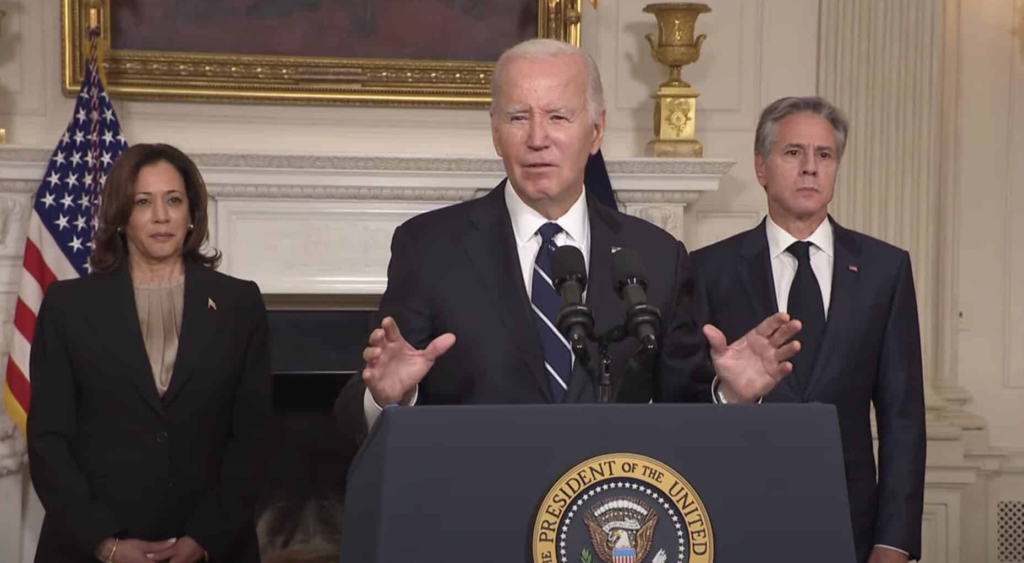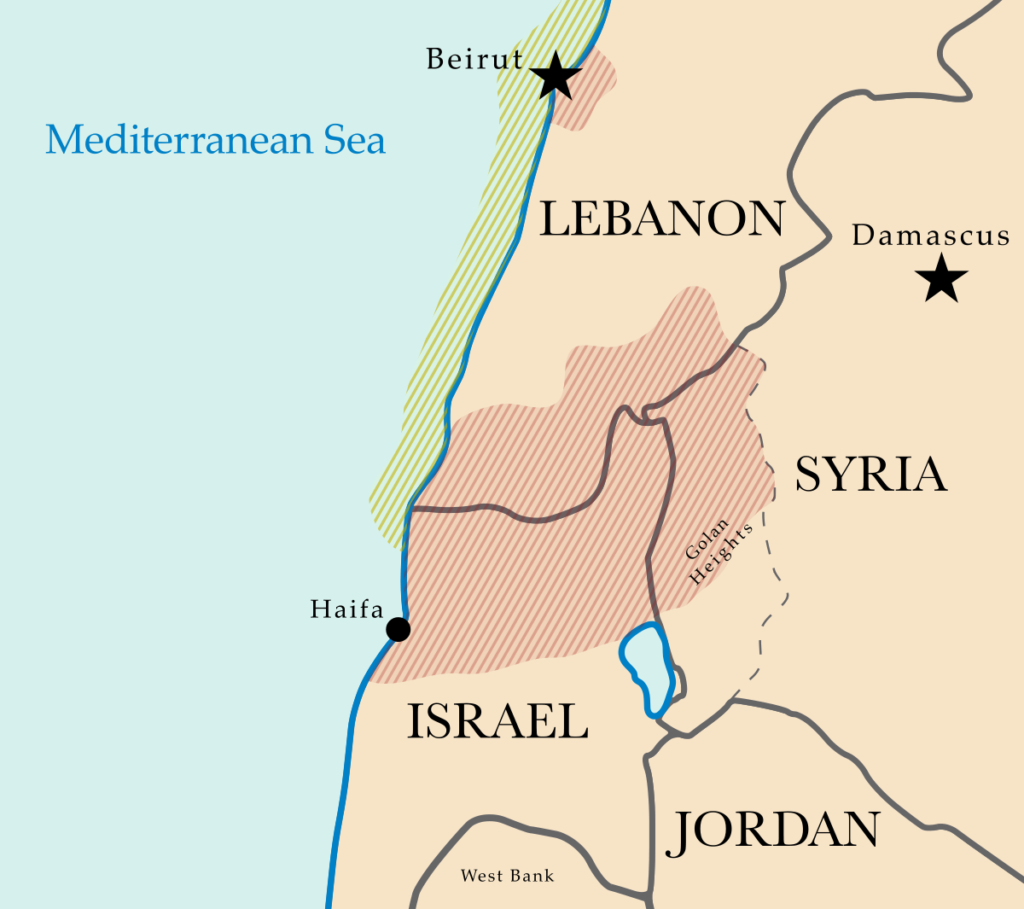Biden’s Policy Paralysis Towards Gaza’s Future, Lebanon’s Vulnerability and West Bank Settlers’ Chaos

By: Ghassan Rubeiz / Arab America Contributing Writer
President Biden cautions Israel not to reoccupy Gaza, attack Lebanon or continue to harass Palestinians in the West Bank and East Jerusalem. He sends his advisors to the region to deliver his messages directly. Beyond offering advice, caution or warning, Biden rarely acts on his words. This inconsistency between Biden’s feelings and actions might be hurting the US’ image in the world. Opinion writer Karen De Young argues that support of the White House of Israel’s excessive retribution in Gaza “could come at a cost to foreign policy.”
Over the weekend, Biden’s National Security Advisor, Jack Sullivan, paid a visit to Palestinian Authority President Mahmoud Abbas to discuss with him how to prepare his factions of Palestinians to rule over Gaza when the war ends. This approach will not work. Abbas is too weak and compromised for the job required.
Empowering Palestinian Leadership

Gaza needs strong, credible Palestinian leadership. Abbas is in his late eighties; he is very unpopular, for many reasons: corruption, expired political term, serving Israel by suppressing Palestinian dissent. Palestinians need inspiring leadership, leadership respected across ideological lines and capable of negotiating creatively with Israelis. As I have mentioned in a previous column, Marwan Barghouti is such a promising Palestinian figure, if freed. He has been in an Israeli jail for twenty one years. Barghouti has been locked up, slapped with a long sentence, to prevent him from mobilizing Palestinians to engage in solid state building. In a December 12 New York Times opinion piece, Jewish Currents’ Peter Beinhart made the case for Barghouti’s release:
As the Israeli newspaper Haaretz has advised in the past, Israel should release the imprisoned Palestinian nationalist Marwan Barghouti, who is more popular than the leaders of Hamas. Mr. Barghouti was convicted of murder and membership in a terrorist organization during a trial at which he declined to offer a defense and refused to recognize the Israeli court’s jurisdiction. But despite defending Palestinians’ right to violently resist Israeli oppression, he has also lauded Nelson Mandela’s willingness to “defy hatred and to choose justice over vengeance.
New York Times
Currently, indirect and very hard negotiations are taking place between Hamas and Israel to achieve a new round of exchanging hostages for prisoners. The US could put pressure on Netanyahu to release Barghouti as soon as possible. Regardless of Barghouti, the quality of future governance of Gaza is crucial. Gaza is now a 2.2 million community in need of physical, political and moral revival. With powerful leadership, a meaningful peace process of long-term consequences is possible.
Up until last week, observers had discounted the development of a new war front between Israel and Lebanon. Not any longer; in recent days, many Middle East analysts opined that the risk of the Gaza crisis spilling over into Lebanon has increased significantly. The White House has rushed their high level diplomats to try to reverse this alarming trend.
Dealing with Lebanon’s Border

Netanyahu has declared that after dealing with Hamas, Israel will have to deal with Hezbollah in order to secure Israel’s north border towns. He could turn Beirut into a second Gaza, he said. After the horrifying events of 7 October, 80,000 Israeli residents moved away from the border in fear of Hezbollah’s threats. Many are living in hotels waiting for their military or diplomats to protect their future. Similarly, Lebanese border villages have evacuated in fear of Israel’s daily air raids.
Since October 7, Israel and Hezbollah have engaged in a low-intensity battle on their (disputed) borders. With measured restraint, both sides have bombed and shelled each other selectively. Hezbollah has suffered over a hundred fatalities and Israel has lost about a dozen soldiers.
The US and France have been busy over the past few days to calm Israel on one side, and try to convince Hezbollah “to abide by United Nations Security Council Resolution 1701” by withdrawing eighteen miles from the borders to behind the Litani River. The idea is to assure Israelis living near the border that they can return safely to their homes. Resolution 1701 ended the 2006 Israel war with Hezbollah, with a formula which, in principle, distanced the Resistance forces from the border. Hezbollah has for years ignored Resolution 1701. The heavily militarized movement argues that Israel has not withdrawn from three occupied villages on the border, namely, Ghajar, Kfar Shouba Hills and Shiba Farms. The Resolution is interpreted differently by the two sides. It should be clear to Washington, that given Israel’s atrocities in Gaza and its long record of disrespecting international law, asking Hezbollah these days to withdraw from the border is not convincing. Incentives are needed to generate concessions. Should Israel withdraw from the three villages it has occupied since 1967, Hezbollah’s presence on the Lebanese border would then be no longer justifiable.
Last week, the White House issued sanctions against individual Israeli settlers who have committed offenses against Palestinians, by banning those settlers from visiting the US. Such travel-ban measures are largely symbolic; they reflect the inability of Washington to deal squarely with a predatory, hegemonic settler movement.
The Settlers’ Movement is Dangerous for Palestinians and Israelis

There are over seven hundred thousand Israeli settlers living in militarized, privileged communities in the heart of the West Bank and in East Jerusalem. As a result of this widespread barbed wire community, life for Palestinians has become increasingly unbearable. This militia movement has been expanding its displacement and marginalization of Palestinians for several decades. In recent weeks, settlers intensified their violence against Palestinian communities. The political force of this religiously-based rightwing movement has accelerated Israel’s transformation into apartheid. In a visit last week to the West Bank, the Washington Post’s David Ignatius described the area as a “ ‘two-plate’ solution”. Ignatius reports that:
Israeli settlers with yellow license plates zoom along on a well guarded superhighway called Route 60. Palestinians with white plates navigate small, bumpy roads.
Washington Post
President Biden’s approach to the settlers is hesitant, perhaps revealing insecurity about his 2024 presidential electoral status. His cautionary language should be coupled with serious consequences. If Biden really cares about Palestinians he should address the Israeli settlers the way he approaches other terror groups, with firmness and sanctions. By simply telling the settlers they have to “respect Palestinian life” is not enough. By barring some of their members to travel to the US will not have the desired behavior-change. Moreover, if Biden is really serious about the security of Israel, he would treat the settlers’ movement as a threat to Israel’s long term security. The Israeli settlement movement has become too powerful to accept reform. It is ready, many believe, to engage in a civil war for self preservation.
In all three issues discussed above, namely, Gaza’s new leadership, finalization of land borders between Israel and Lebanon and the disciplining of West Bank settlers’, the US acts as if it has limited power over Israel. Yet Washington has no conditions in supporting Israel.
Washington has not yet reached the readiness to use its financial or military aid, as well as its exceptional diplomatic shielding to Israel, in dealing with Netanyahu.
Ghassan Rubeiz is the former Middle East Secretary of the World Council of Churches. Earlier he taught psychology and social work in his country of birth, Lebanon, and later in the United States, where he currently lives. For the past twenty years, he has contributed to political commentary and delivered occasional public talks on subjects related to peace, justice, and interfaith. You can reach him at rubeizg@gmail.com
The views and opinions expressed in this article are those of the author and do not necessarily reflect the position of Arab America. The reproduction of this article is permissible with proper credit to Arab America and the author.
Check out Arab America’s blog here!









